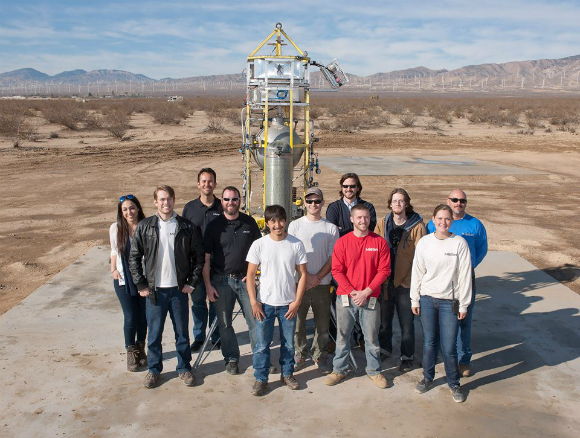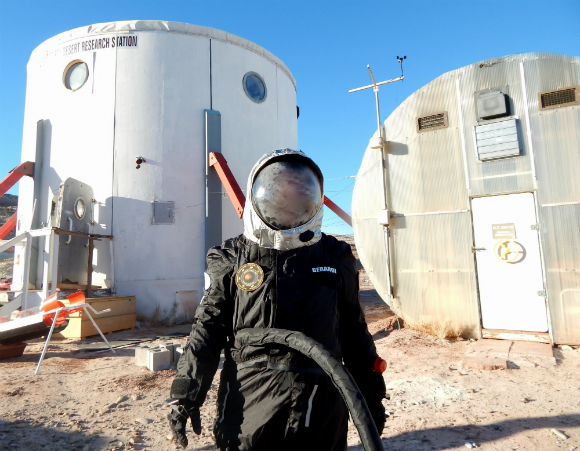
When you consider all of our nation's spaceflight triumphs, it's easy to forget that mankind has only been a spacefaring species for 54 years. Everything in the entire history of spaceflight has occurred in the last five decades: we've put a dozen men on the Moon, we've built and occupied an International Space Station, we've photographed hundreds of billions of galaxies, we've sent a probe into interstellar space, and we've witnessed the revolutionary birth of a private space industry, headed primarily by entrepreneurs.
I enjoy contributing my small part to mankind's incremental expansion in the solar system. By day, I work with reusable rockets at Masten Space Systems, and by night, I monopolize dinner conversation with the wonders of spaceflight.
I'm not a big fan of industry predictions. Looking back, they often miss the mark, over-promising capabilities and undervaluing applications. For instance, who could have predicted the profound societal impacts of GPS, satellite television, and the shock-absorbing soles of Nike Air Max? Frankly, I think Michael Jordan could express a little more gratitude to space exploration. The last decade has seen the birth and rapid growth of a private spaceflight industry that's unlocking commercial launch services, space tourism, orbital and lunar destinations, commercial space stations, asteroid mining, and everything in between. Instead of predictions, I'll share with you my top five personal expectations for the next decade in the commercial spaceflight industry:
1. I'm Going to Space.

(c) Steve Boxall for Zero G Corp.
A taste of space, flying weightless during a zero gravity parabolic flight.
In 1961, Soviet cosmonaut Yuri Gagarin earned the distinct honor of being the first human to journey into space. Today, in 2015, fewer than 600 people have followed in his footsteps. That's all about to change. More than 1000 people have already pre-purchased tickets for space tourism experiences with companies like Virgin Galactic, XCOR Aerospace, and World View Enterprises. In the next few years alone, we're going to double the number of people who have ever been to space, creating new classes of spacefarers and citizen scientists. This is the industry that's going to give me, an ordinary, non-test pilot civilian, the chance to go to space.
2. I'm Going to Make Money in Space.

(c) NASA / Tom Tschida
Celebrating a successful flight on the launch pad at work
"What can we expect from the next 10 years in space?" might be the world's first trillion dollar question. I may have missed the dot com boom, but I'm sure as hell not going to miss the space boom. All of the incredible capabilities that have been maturing over the last decade are going to come to fruition in the next few years, and thanks to reduced launch costs and increased launch frequency, Earth's economic sphere will expand to include new applications and businesses on the moon and in low-Earth orbit. Within the next decade, savvy entrepreneurs will descend on all the areas that are ripe for disruption, from small satellites to big data.
3. I'm Going to Get Answers to Some Big Questions.
I consider myself a space evangelist. Sometimes I even leave a copy of Neil deGrasse Tyson's Origins in hotel nightstands, to round out the reading material. Where did we come from? What's in store for the future of our planet? What else is out there? Very soon, I expect to have confirmation of other life in the universe. And I'm not the only one. NASA chief scientist Ellen Stofan recently predicted "strong indications of life beyond Earth within a decade." Microorganisms in the icy oceans of Jupiter's moons? Possible! Organic molecules on Mars? Maybe! The commercial spaceflight industry will continue to aid these existential investigations, providing cost-effective engines, subsystems and technology maturation, freeing up resources to allow NASA to do what it does best: explore.
4. I'm Going to Sleep Better at Night.

The Mars Desert Research Station, a prototype laboratory where I spent three weeks studying space settlement and in situ resource utilization.
Call me sentimental, but I really care about the future of the human race. We've got all our eggs on one planet right now, a planet which, one day, will cease to support life. And that's only if we don't wipe ourselves out first. Mankind's future as an interplanetary species is not only an achievable goal, but a necessary one. We need to move beyond the "flags and footprints" missions and travel to space with the intent to stay, and Mars is our best bet. The good news is that the majority of the obstacles are economic, rather than engineering. The bad news is that it's a tough business case to close. I'm looking forward to another decade worth of advancement in 3D printing, life support systems, solar power, and robotics, and I'm confident we'll emerge with a concrete plan for man's first space settlement.
5. Space Will Be a Kitchen Table Topic.

Dropping some space facts on the fine ladies of ABC's The View
When Playboy contacted me proposing a feature on my scientific expedition to the Mars Desert Research Station, I started crash-dieting and preparing an apologetic but firm rationalization for my husband. They quickly clarified that this really was about the article, and I'd be appearing in a full flight suit. It was humbling, but also a relief. After returning to solid foods, I noticed a new appetite in the media for space content. At times, it has seemed as if our industry existed in an echo chamber, reaching only each other. Lately, though, it seems that space has hit the mainstream, and I'm noticing increased public interest, excitement, and ironic tee-shirts. Since much of our nation's science and exploration funding is tied to election cycles, public support for the space industry is crucial. In the next 10 years, I want to see space policy emerge as a core discussion in family rooms and classrooms across America.
This post is part of a series commemorating The Huffington Post's 10 Year Anniversary through expert opinions looking forward to the next decade in their respective fields. To see all of the posts in the series, read here.
_________________
Kellie Gerardi is the Business Development Specialist at Masten Space Systems, the Media Specialist for the Commercial Spaceflight Federation, and a Mars settlement researcher.